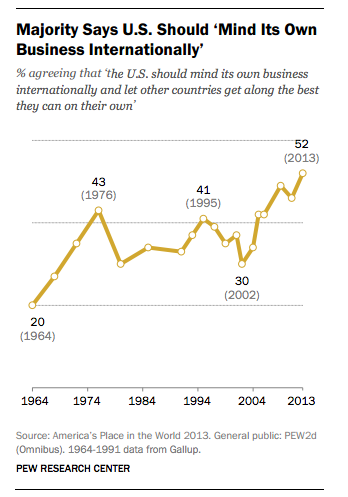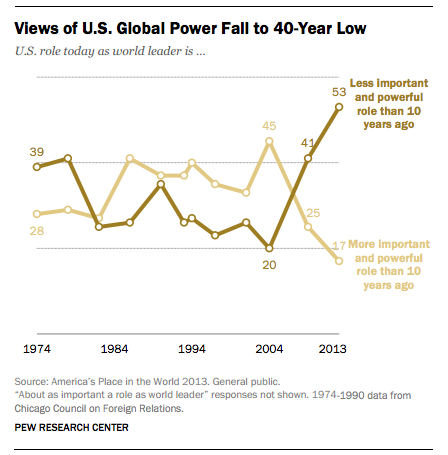Taliban fighters in custody in Jalalabad earlier this year.
When the U.S. public agrees with the Taliban that the U.S. role in the world is declining, perhaps you should pay attention. To be sure, U.S. public support for international intervention rises and falls like the tides. It spikes following an outrage like the 9/11 attacks, and then falls after an initial spurt of enthusiasm and two wars that have cost an estimated $1.5 trillion and 6,800 lives.
The Taliban feel that U.S. lethargy. “As a result of these wars and their financial costs, the U.S. has lost all appetite for further military adventures,” the Afghan Taliban say in a recent post on their Voice of Jihad website that is equal parts agitprop and intel report.
What’s disconcerting is that the U.S. public agrees, according to a poll of 2,003 American adults conducted by the Pew Research Center released last week. “Currently, 52% say the United States `should mind its own business internationally and let other countries get along the best they can on their own,’” the survey concludes. “Just 38% disagree with the statement. This is the most lopsided balance in favor of the U.S. `minding its own business’ in the nearly 50-year history of the measure.”
Put simply, Americans are tired of wars. The recession has made them less ambitious overseas (while 83% see protecting the U.S. from terror attacks as a top U.S. government priority, 81% see protecting U.S. jobs the same way). President Obama’s hemming and hawing over Syria has left many Americans leery of his leadership. Meanwhile, the Taliban are simply tired of drones, which they cite as evidence that the U.S. has become a “paper tiger”—echoing Osama bin Laden’s 1998 pre-SEAL boast—in that recent post:
The drone strategy betrays a far more crucial fact than mere tactical failure. What it shows is that America is no longer a military power confident of itself. It can no longer assert itself militarily.
The fact is, that after more than 12 years of war, the Taliban based in Afghanistan—those who offered bin Laden the safe haven he needed to oversee the 9/11 attacks—have survived U.S.-led conventional military attacks, followed by a counter-insurgency campaign. Drone strikes, the Taliban say, are simply the final U.S. chapter in a failing strategy.
The U.S. abandoned Afghanistan following the Soviet withdrawal from that country in 1989, and the Taliban are counting on a repeat performance. That’s what makes the U.S. troop presence there beginning in 2015 so important.
“The Taliban are hoping to regain the momentum post-2014 and will make a major effort to do so,” retired Army general Jack Keane recently told Congress. “What we want to demonstrate to the Taliban clearly—not just in our words but in our actions—that we are committed, that the stability of Afghanistan is real to us, and we’re going to see it through to the end, and we’re not going to bail out as 2014 approaches.”
The Taliban are listening, but are not impressed. “The financial and military cost of a counter-insurgency means that the U.S. has abandoned all hope of defeating its self-proclaimed opponents militarily,” the Taliban post says. “It is instead satisfied with a few cosmetic operations that continue the semblance of American determination to continue this war, but which in reality achieve nothing substantial on the ground and yield the entire battlefield to its opponents who roam at will and institute their programs in it.”
So long as the Taliban and its allies limit themselves to similar small-scale “cosmetic operations”—and given a war-weary U.S. public—they will remain a key player in Afghanistan long after all combat U.S. troops have left a year from now.



